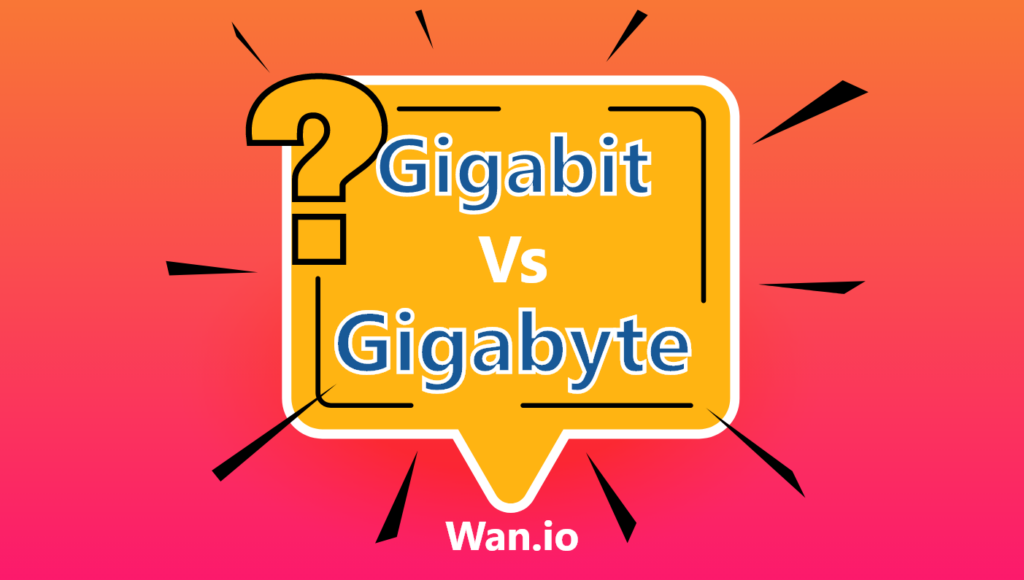Gigabit Vs Gigabyte: Explain the Difference Between GB and gb?

Gigabit and gigabyte are both terms that measure something. Gigabits means a lot more than just “a lot” though! The difference between the two can be important for certain things like networking, so make sure you know which one is being used when talking about bandwidth or storage space on your computer.“
GB stands for Gigabyte and gb stands for Gigabit.
Gigabit (GB)Vs Gigabyte (gb)
Living in this digital era, you may have come across many familiar abbreviations and terms, but you do not understand them completely. Yet you do not feel comfortable using these terms at the right place and time and Google their meanings to get a complete understanding.
For example, Gigabit (Gb) and Gigabyte (GB) are terms which may be confusing for you. But, do not worry; here in this article, you can get a comparison between Gigabit Vs Gigabyte and know how they can impact your business and how they are related to fibre broadbands and leased lines.
You know that GB and Gb are part of IT terminology, so it is a little blurry for you if you do not have specific IT knowledge. However, it is essential to distinguish between these terms as they can tell you whether you are getting the right deal on hosting or how much space you have. Both Gb and GB are units of measure and are usually used for digital storage space; this is what they have in common.
" So keep on reading to know more about these terms. But before getting into gigabit Vs gigabyte, let's first understand the binary code, which is the absolute basis of computing.
Basics Of Binary Code

A binary code consists of 1s and 0s, and the computer reads this binary code. It seems amazing when you think about it that we input data into the computers using keyboards, microphones and mice, and the computer gives us output through monitors, headphones, speakers or printers, but the computer interprets everything in binary code.
Every input we ever give to a computer and the output received is a string of 1s and 0s at some point on the computer processor. The main advantage is that the computer process is able to process 0s and 1s faster.
Now comes to the main point of this article: the difference between a bit and a byte. A bit comprises a single 1 or 0 in a line of binary code, while a byte is equal to 8 bits.
What Is A Gigabyte?
Gigabyte is a commonly used term that is often shortened as GB. It describes the space or memory of a computer or mobile device. The other field where you can see frequent use of this term is hosting services. For example, if you want to rent a Virtual Private Server (VPS), an internet plan or a dedicated hosting package, Gigabyte is used to describe the space given to you.
Now comes the definition of Gigabyte; A gigabyte is a specific data unit that is equal to about 1 billion bytes of data. According to the Cambridge dictionary, it is defined as a measurement unit of computer information consisting of 1,000,000,000 bytes. The International System of Units (SI) is represented as ten to the ninth power. On the scale, it comes after megabytes and before terabytes.
What Is Gigabit?
A gigabit is much similar to Gigabyte because both of them represent a digital storage unit. Now you may wonder how a bit is different from a byte. Simply put, a byte is equal to eight bits. It means that a byte is eight times the Bits are usually used when we have to measure the data transfer rate over a network.
According to the technical definition, a gigabit is one billion bits or 109 bits. As we all know, Giga is a metric prefix for billion; that is why Gigabit is one billion bits. It is basically one billion 1s and 0s and abbreviated as Gb. Internet service providers used Gigabit to measure internet speed as Gigabit per second. Most local internet providers advertise gigabit internet speed.
This speed represents the ability of your internet connection to send one Gigabit of data to your business or home. In other words, we can say that Gigabits are used to measure the data transfer rate of local networks, and it is represented as GBps means Gigabit per second.
A Quick Glance At Gigabyte Vs Gigabit
We understand that understanding bits and bytes is a bit confusing. For your ease here we are providing a quick comparison in the following table:
Why Do People Confuse Between Gigabit & Gigabyte

Gigabit and gigabytes sound similar and can cause great confusion at times, especially when you are not tech-savvy. Sometimes hosting companies also use these terms interchangeably to attract more customers, which is not a good practice.
So watch out when choosing a hosted service for your business because if you have mistaken a Gigabit by Gigabyte, you will purchase eight times less space. However, since you have an understanding and know the difference between GB and Gb now, you do not need to worry about getting less space than your expectations.
Be careful when choosing a hosting company; if you find a company using Gb and Gb interchangeably, you should avoid them to protect yourself from any inconvenience.
Importance of Understand the Difference Between Gigabit and Gigabyte
Most hosting companies use gigabytes to measure the storage space of RAMs, disk space or bandwidth. It is important to know because if a company measures it in gigabits, you will get less than expected space.
Sometimes, the companies offering shared hosting services use these terms. However, most companies offer unlimited bandwidth and disk space in a shared hosting package. But you have to consider another shared hosting account if they do not.
As a whole, we can say that the importance of understanding the difference between Gigabit and Gigabyte is when you are using a dedicated server hosting. It will make a huge difference, and you may end up paying for more space when a company uses gigabits instead of gigabytes.
How Do Gigabytes And Gigabits Work Together?
As we described earlier, internet service providers measure internet speed as Gigabit per second, while Gigabytes are used by hardware manufacturers to measure file sizes. So speed and size should work together to make everything work. Let’s understand the working of Gigabit and Gigabyte together by an example.
Suppose you just moved to a new city and are looking for an internet connection. Different internet service providers will offer you fancy packages of gigabit internet. Suppose your service provider offers you a package with a speed of 1 gigabit per second but a data cap of 6,000 Gigabytes per month.
So now, let’s do a quick calculation; if you want to download a file of 1GB with no slow down of speed, it will take 8 seconds. With a data cap in your package, you have to think about how much time you can download a file before paying any extra fee. We hope that from this example, you can get an idea of how the speed of 1 gigabit works with a 1-gigabyte file size.
Gigabit, Gigabyte And Business Internet

When you are using the internet at home, you can not understand the benefits of high speed internet as you do not need to upload or download large files. However, the speed of the internet connection can affect your business productivity.
A business requires gigabit internet speeds to perform its day-to-day operations efficiently. So you have to switch from traditional broadband to a dedicated connection or leased line connection. This way, you can get a dedicated fibre connection that comes with higher speed and fixed bandwidth.
Pro Tip
When you upgrade your connection to a leased line, you can use cloud-based applications, move to VoIP for communication, and reduce operating and calling costs. It can also help you in growing your business without any issues with slow internet speeds.
Wrapping Up
To sum up, Gigabits are used to measure the speed of the internet, while Gigabytes are used to measure storage space. These terms are usually used by hosting service providers. If you see that your hosting provider is using Gigabit for measurement, it means that you are getting eight times less storage as compared to gigabytes. Therefore, do not hurry to sign a contract before seeing whether the service providers are using Gigabit or Gigabyte as a measuring unit.



